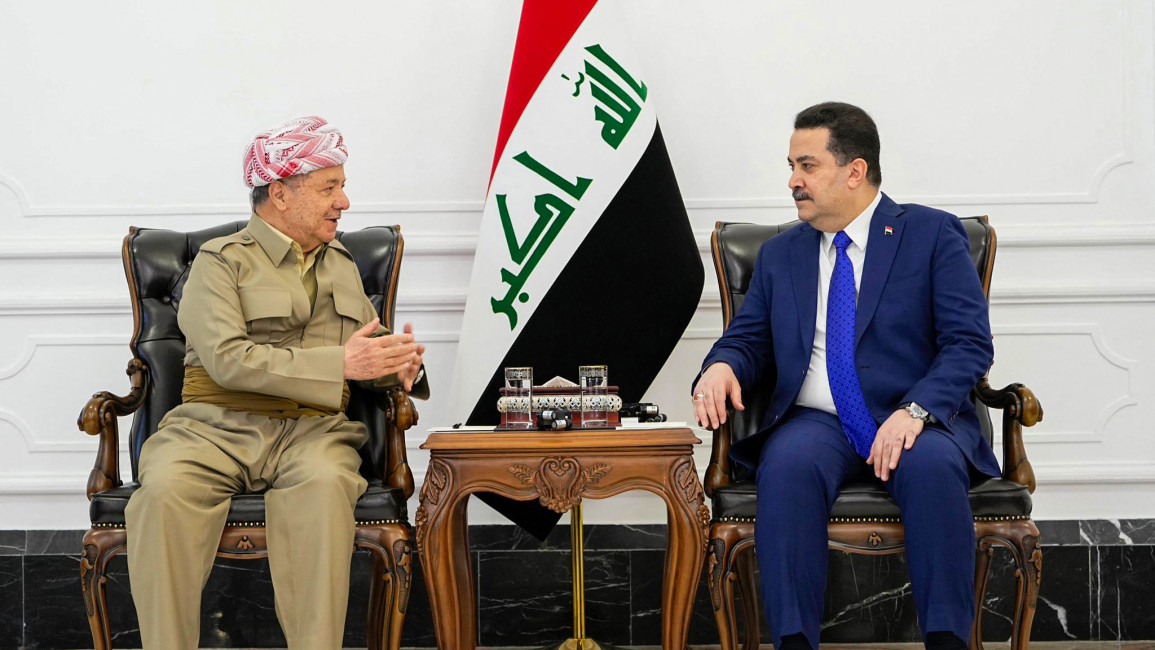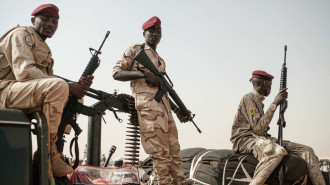Barzani addresses longstanding tensions during first Baghdad visit since 2018
Masoud Barzani, leader of the Kurdistan Democratic Party (KDP), arrived in Baghdad on Wednesday for a two-day official visit, marking his first trip to the Iraqi capital in six years. The visit aimed at supporting the cabinet of Prime Minister Mohammed Shia' Al- Sudani, and dealing with suspended issues between Baghdad and the regional government in Erbil, sources told The New Arab.
"This visit to Baghdad, given the significance of the meetings and dialogues, is particularly important as we speak with a national leadership who plays a major role in the political process," said al-Sudani. Barzani described the discussions as "constructive", noting that "viewpoints were identical."
Barzani has met with key political figures, including the Iraqi president and those from Iran-backed factions. He met with the Coordination Framework, the largest political group in the Iraqi Parliament, at the residence of senior Shia leader Ammar Al-Hakim.
Sudani is aiming for a second term as he prepares to run his independent list in Iraq's upcoming parliamentary elections, seeking support from various political factions. His recent actions have stirred discontent among pro-Iran groups, particularly former PM Nouri Al-Maliki, who has proposed that an early election be held and suggested that Sudani should step down if he seeks re-election.
"Barzani came to Baghdad for two main reasons: first, to reaffirm his support for Sudani, as his government has been cooperative in addressing outstanding issues with the KRG, and while Sudani's cabinet faces pressure from al-Maliki's bloc," a well-informed source in Baghdad told TNA on condition of anonymity. "The second issue was that Barzani wanted to permanently resolve the delay in paying the KRG security forces by the Iraqi government, aiming to make this resolution a notable achievement for his party in the upcoming parliamentary elections in the Kurdistan region."
The Iraqi government is obligated to pay the KRG public employees and security forces under a decision from Iraq's Supreme Federal Court. However, the disbursement of the necessary budget for monthly salaries has been delayed as Iraq's finance ministry conducts a comprehensive audit of the extensive public sector payroll, which includes nearly 1,250,000 employees and numerous ghost names. The KRG employees and security forces have yet to receive their June salaries.
Additionally, Barzani held talks with ambassadors from the United States, the United Kingdom, France, China, and Russia.
Iraqi political parties are hopeful that Barzani's visit will help resolve long-standing disputes, such as the Kurdistan region's budget, parliamentary elections, oil and energy issues, and the formation of a local government in Kirkuk. Kurdish political observers suggest Barzani seeks assurances against election interference from the Iraqi government and Iran-backed factions.
Opposition groups in the Kurdistan Region, however, have voiced concerns. Shaswar Abdul Wahid, head of the New Generation opposition party, has argued that Masoud Barzani's aim during his visit to Baghdad was to prevent the Iraqi government from directly paying the KRG employees’ salaries, a decision previously upheld by Iraq's top court. Wahid has accused the Kurdish ruling parties of manipulating public sector salaries for their own political benefit.
In an immediate outcome of Barzani's visit, the Iraqi government annulled decisions made by Nineveh's Provincial Council on Tuesday. Saido Khairi was appointed mayor of Shingal (Sinjar), a significant move for the Yazidi community, while Sardar Siyamand from the Patriotic Union of Kurdistan (PUK) was elected mayor of Makhmour.
The United Nineveh coalition, including the KDP and Sunni blocs, boycotted the meeting due to exclusion from the voting process.
Barzani's previous visit to Baghdad was in November 2018, following the 2017 Kurdish independence referendum, which led to a crisis with the federal government. Post-referendum, the Iraqi army and Popular Mobilisation Forces entered Kirkuk, expelling the Peshmerga and appointing an Arab acting governor.
In early 2022, tensions escalated when Iraq's Federal Supreme Court declared the Kurdish oil and gas law unconstitutional.
Elections in Iraqi Kurdistan were postponed from late 2022 due to disputes between the KDP and the PUK. In February, Iraq's top court ruled to reduce the Kurdistan Parliament to 100 seats, ending the quota seats for minorities. The Independent High Electoral Commission has since prepared for the upcoming vote.
In March, the KDP announced a boycott of the upcoming parliamentary elections due to concerns over Baghdad's decision to eliminate the minority quota. However, last month, the party reversed its decision and opted to rejoin the electoral process after Iraq's top court identified five seats for the minorities in the region.
Masoud Barzani, aged 77, is a Kurdish politician who has led the Kurdistan Democratic Party (KDP) since 1979. He served as President of the Kurdistan Region of Iraq from 2005 to 2017. His son, Masrour Barzani, currently serves as the KRG PM, while his nephew, Nechirvan Barzani, holds the position of President of the Kurdistan Region.







 Follow the Middle East's top stories in English at The New Arab on Google News
Follow the Middle East's top stories in English at The New Arab on Google News
![Lebanon after strikes [Getty]](/sites/default/files/styles/image_330x185/public/2184409977.jpeg?h=a5f2f23a&itok=7wpfQMyI)
![G20 Brazil [Getty]](/sites/default/files/styles/image_330x185/public/2184389194.jpeg?h=a5f2f23a&itok=t1DchCMY)
